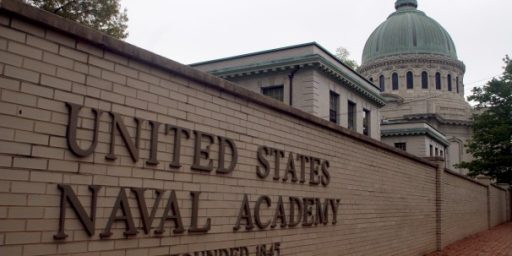Herndon Climb, Naval Academy Tradition, in Peril
The Herndon Climb, a Naval Academy tradition going back generations, may be scraped for no apparent reason.
In the name of safety, the U.S. Naval Academy is considering an overhaul of one of its most bizarre traditions: the annual ritual in which a thousand first-year midshipmen struggle to conquer a 21-foot granite obelisk coated with 200 pounds of lard.
The Herndon Climb has occupied a hallowed place in Naval Academy tradition for decades. For members of the plebe class, the climb represents what a former midshipman called “our final exam of all finals.” The starter gun fires, and the plebes, working together, race to replace a blue-rimmed sailor’s cap, known as a “dixie cup,” with a midshipman’s cap.
The scene is unforgettable to those who watch, as the sweating, grunting, red-faced midshipmen at the bottom, their arms linked, support a human pyramid surging to the top of the monument. The pyramid often collapses, but the plebes invariably make it to the top whether it takes them minutes or hours.
But at the ever-changing academy, the climb may be going the way of the sailing ship and the smoothbore cannon. “Similar to how our Navy looks at all traditions in the Fleet, we are evaluating the Herndon Monument Climb to ensure the event remains a valid part of our heritage but it is conducted with professionalism, respect, and most important, safety in mind,” the academy’s public affairs office said in a statement.
It is unclear what changes might be imposed. This year’s climb is scheduled for 9 a.m. May 15.
Deborah Goode, a spokeswoman for the academy, said that she could not recall any serious injuries resulting from the Herndon Climb and that the reevaluation was part of a broader reconsideration of the end-of-year events for plebes.
Alumni scoffed at the risk of someone’s getting hurt, especially given the school’s mission to prepare officers for combat.
“It’s not dangerous. That’s a lame excuse,” said Dwight Crevelt, who made it to the top of the monument in 1976. Crevelt never graduated from the academy, because his eyesight went bad after two years at the school. But his memory of scaling the mud- and lard-spattered obelisk — and the week of glory that followed as he was feted like an admiral — remains strong. “It’s the wrong move to make,” Crevelt said. “You’re trying to build team spirit, camaraderie, and that’s the ultimate in team effort. . . the team going after that.”
Herbert McMillan, a 1980 graduate who became an airline pilot and Annapolis politician, also opposes a change. “We’re going to send these guys to war but they can’t climb a monument because they might get hurt? Come on,” he said. “It just seems like a solution in search of a problem.”
No kidding.
Maybe they’re just embarrassed that classes from the 1960s could scale the thing in under 5 minutes, whereas recent classes are taking as long as 4 hours.




Good lord this is nanny statism at its worst.
They are adults, they are future officers, I think they can handle the risks involved.
How is this nanny statism? Congress isn’t making a law forbidding the Herndon Climb. Rather, the leaders of the academy are making the decision. Those are the people that should be making the decision.
Now, that doesn’t mean the possible decision isn’t stupid…
Brian,
nanny statism is not just acts of congress. It is when anyone in authority over adults removes their rights of making choices without a compelling reason. Certainly we can debate what constitutes a compelling reason, but none seems to have been entered here.
The government deciding that I should drive on the right side of the road is a limitation on my freedom of choice, but it is based on a compelling reason. If the naval academy was to force the cadets to participate or force them to not participate, they would be engaging in nanny statism.
Let the midshipmen (and women) individually decide to participate and then jointly work to accomplish the goal.
Pretty much what YAJ said Brian.
Nanny statism is the idea that somebody in authority needs to tell others-especially adults what they can or can’t do for their own good.
Some of those things have good reasons behind them, but I see no compelling reasons for eliminating this yearly ritual/tradition. Especially since it involves adults, and there have never been any serious injuries.
Yes, I am being a bit pedantic, but it does seem that if one is going to use the term “nanny statism” then the state needs to be involved in the action in question.
In regards to the actual event, I must confess as to not getting the point of climbing a greased up monument.
I think Steven Taylor gets to the reason for the ban–the homoerotic nature of grown men climbing together up a greased pole is antithetical to the “don’t ask, don’t tell” policy of the military.
Welcome to the Nanny State. Pretty soon we’ll outlaw war, and disband the military.
It is worth noting that in the wikipedia article the classes in the 1960’s what completed the event in minutes had the aid of a cargo net (1962) or the monument was ungreased (1969). Otherwise the times are comparable.
The banning of the event is reminiscent of an overprotective mother using the PTA to ban dodge ball at an elementary school. Most colleges in the country (including the Naval Academy) have rugby teams who are in far greater danger on a weekly basis than the participants in the Herndon climb.